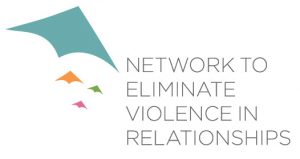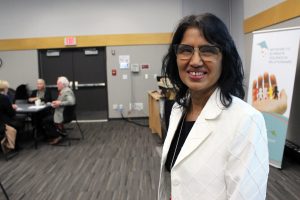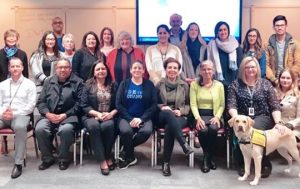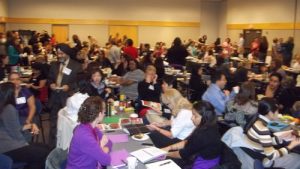Chapter 2: What is NEVR?
Jennifer Marchbank and Balbir Gurm
Key Messages
- The Network to Eliminate Violence in Relationships (NEVR) was established in 2011 as a grass roots movement representing 200 dedicated cross-sector professionals and service providers (representing over 100 organizations) in the lower mainland, who champion and advocate for social justice change pertaining to relationship violence.
- Facilitated and hosted at Kwantlen Polytechnic University – as a neutral facilitator – the NEVR model is grounded in a social constructivist environmental framework in which the individual, family, and community all interact to establish a culture that accepts or rejects RV.
- NEVR activities include 8 meetings throughout the year, and an annual conference that brings together a cross-section of social sector professionals, students, and academics to discuss and advance issues of RV. Other activities have included the development of toolkits, public campaigns, academic outreach, community engagement, education and training, and systemic policy changes.
Relationship violence (RV) is any form of physical, emotional, spiritual and financial abuse, negative social control or coercion that is suffered by anyone who has a bond or relationship with the offender. In the literature, we find words such as intimate partner violence (IPV), neglect, dating violence, family violence, battery, child neglect, child abuse, bullying, seniors or elder abuse, male violence, stalking, cyberbullying, strangulation, technology-facilitated coercive control, honour killing, female genital mutilation, gang violence and workplace violence. In couples, violence can be perpetrated by women and men in opposite-sex relationships (Carney et al., 2007), within same-sex relationships (Rollè et al., 2018) and in relationships where the victim is LGBTQ2SAI+ (lesbian, gay, bisexual, transgender, queer, Two-Spirit, intersex and asexual plus) (The Scottish Trans Alliance, 2010; Rollè et al., 2018). RV is a result of multiple factors and impacts such as taken for granted inequalities, policies and practices that accept sexism, racism, ageism, xenophobia and homophobia. It can span the entire age spectrum. It may start in-utero and end with death. Although men are portrayed as the majority of perpetrators of RV, they can also be abused.
NEVR – Network to Eliminate Violence in Relationships
NEVR is a committee of almost 200 individuals from over 100 organizations (www. kpu.ca/NEVR). Service providers, government officials, health, social services and justice professionals, educators, researchers and community members get together to collaborate, learn and advocate for changes to address relationship violence. In this chapter, we describe how we became NEVR, contributions we have been able to make to create change, and the resources that we have developed.
NEVR Framework
The NEVR framework is grounded in a social constructivist environmental framework in which the individual, family, and community all interact to establish a culture that accepts or rejects RV. The individual response and reaction are mediated by their personal understanding of their resources and their abilities to take action. Survivors report or seek help based on their personal roles and positions in society. As well, those who provide services or create policy/law setting agencies do so through their own multiple intersectionalities. When creating NEVR, we paid attention to the power imbalances that exist and hegemonic practices that pertain. Next, we will explain how we have become NEVR since it began in 2011.
Becoming NEVR

In 2011, service providers approached Dr. Balbir Gurm, Nursing Faculty, KPU. Service providers requested that along with hosting yearly conferences with expert speakers, she provide a space for them to learn about other organizations and their programs, provide a voice to address issues that are faced by clients and find ways to advocate for change.
Dr. Gurm agreed to lead this initiative with one caveat. She wanted to understand what all those who work in addressing the cycle of abuse thought. In 2011, she facilitated a project with colleagues from the domestic violence sector to understand the perspectives of police, court personal, non-profit service providers, government services, educators and the healthcare providers, as well as offenders and survivors. This step supported the community’s call for advocacy and sharing amongst organizations. It was found that organizations did not fully understand what was happening in different departments within their own organization nor in other organizations, and there were many ideas on how to improve the system. See the full report (Gurm et al., 2013). This report was formally launched at a KPU media event and attended by about 100 service providers, educators, police, justice and health personal. In the first meetings, the idea was to name the committee and to create a strategic plan. This strategic planning session was led by KPU Vice-President Emeritus, Linda Coyle, who has been involved with equity and women’s issues most of her adult life. Linda has served on many boards including Richmond Chamber of Commerce, Surrey Social Policy Advisory Committee, BC Labour Force Development Board, and the Coalition of Visible Minority Peoples of BC, to name a few. She was the founding (1991) president of WPSE-Women in Post-Secondary Education. The session was co-led by Maureen Shaw; a union activist and officer, a President of the College Institute Educators’ Association (now FPSE), Vice-President (Negotiations/Grievances) of the Kwantlen Faculty Association (KFA), founding President of the National Union of the Canadian Association of University Teachers (NUCAUT), and a Vice-President of the Canadian Labour Congress. She was also a member of the BC Labour Relations Board. This half-day meeting created a mission and strategic plan. At the end of the day, the 60+ members who attended the meeting could not agree on a name. They wanted something that had a catchy acronym.
Dr. Gurm was declared the facilitator for the network because it was understood that in her position as KPU Nursing Faculty, she was not competing for services funding and would be a neutral facilitator without prejudice. Her first duty was to run a poll for a name. By a narrow margin of one vote, the Network to Eliminate Violence in Relationships or NEVR for short was created.
NEVR was established in 2012, as a committee that values everyone’s opinion and is a safe space for all individuals to voice their concerns. The committee is open to all, not exclusionary, welcomes diverse voices and allows those present to have a vote if consensus is not reached at meetings. It is agreed that anyone’s particular knowledge/voice would not be privileged, and dialogue would be encouraged to increase understanding. Also, it is understood that the facilitator would advocate with different government bodies and organizations. Community organizations that are involved in NEVR include battered women’s support services, police departments at a municipal and provincial level, health authorities, religious organizations, secondary and post-secondary education institutions and government ministries See the complete list of NEVR members and community partners (NEVR, 2020).
Actions

NEVR has eight monthly meetings throughout the calendar year and at least one conference annually. Through NEVR, several initiatives have been developed by its members in partnerships. These include academic partnerships in interdisciplinary fields (e.g., forensics, nursing, psychology, gender studies) manifested in conferences and research projects, increasing public awareness through media outreach, as well as policy change. Four subcommittees were initially established: conference, media, courts, and children. Each subcommittee was to work on their particular area of interest. The conference committee was supported by KPU nursing students and it remained the most active, organizing a yearly conference that started as a one-day symposium with presentations from experts. This format changed later to a two-day conference with experts and members sharing best practices to increase understandings of the state of knowledge but also the RV system as a whole.
The court committee continues to advocate for integrated courts, both criminal and family areas, as a one-stop-shop for services. The media committee was very active in the early days with a monthly hour-long radio program, media releases and articles about special events. The children’s committee was active early on, lead by an executive director from the Vancouver area. After a phase of slowing down its practices due to issues related to distance and time, the children’s committee work continued with the assistance of nursing students. Working together, Surrey community school staff members and high-risk girls created a toolkit for middle school children (Gurm et al., n.d.). Although this toolkit has not been evaluated, others (Walsh et al., 2016; Zwi et al., 2007) have found that school-based programs increase protective behaviour knowledge regardless of the type of intervention program. Similar findings have been suggested by Fitriana et al. (2018) who also assert that peer education models are effective in addressing relationship violence.
Other specific resources have been developed, including the Community Champions Toolkit; the Domestic Violence Toolkits tailored individually to Bartenders and Salon Professionals; and the Domestic Violence Toolkit for Healthcare providers in British Columbia (all available for free at www.kpu.ca/nevr).
These Toolkits focus on recognizing domestic violence and signs of abuse, as well as understanding why victims of abuse stay in abusive relationships. They include information about overcoming hesitation with helping which is adapted from the Centre for Research and Education on Violence Against Women and Children (e.g., feeling like it’s none of your business vs. realizing that it could be a matter for life and death; violence is everyone’s business) (Western Centre for Research and Education on Violence Against Women and Children, 2002). Toolkits also include action items for talking to the abuser, including what to do if they deny the abuse as well as safety planning. In addition, these toolkits offer cultural considerations and their influence on behaviour, specifically Aboriginal women, immigrant, and refugee women, and offer some legal considerations for intervention in RV.
Academic Outreach

In terms of academic conferences and partnerships, NEVR has hosted nine interdisciplinary conferences and three workshops between 2012 to 2019. We estimate that these conferences had the collaboration of 1400 people and an audience of 120 participants each. NEVR has also presented at Kwantlen Polytechnic University’s (KPU) first Teaching, Learning, Scholarship and Research Symposium in June 2017 and acts as a practicum placement for KPU nursing students and Adler University’s graduate students. In addition, NEVR’s framework was shared through an academic tour with university faculty in Thailand and Brazil. It was presented at international conferences for nursing professionals in Australia and an international forensic nursing conference in Vancouver, BC.
NEVR has also created partnership opportunities through which Simon Fraser University and Adler University graduate students can conduct and report on real-world research to bring social change to the community. As well, the KPU nursing program students have created a number of toolkits (NEVR and Community Resources list, 2020). Gender, Sexuality & Women’s Studies students at SFU researched and wrote this report on LGBTQ2SIA+ refugee services for NEVR member organization DIVERSEcity.
Increasing Community Awareness
Besides having its own campaign, NEVR also partners with other organizations working to eliminate relationship violence. NEVR has been active in the international mass action event to end violence against women, One Billion Rising since 2013, and NEVR is beginning to raise awareness about relationship violence against men. Additionally, NEVR was part of the Justice Summit on the family justice system in BC in 2014. In 2016, NEVR, using the performance of a specially commissioned play (funded by a corporate donation of $5000) held an information and fundraising event to educate the public on what happens when a 911 call is made covering events and actions from the time of the call until the judge adjudicates. In the play, NEVR members acted out their real-life roles, and service providers played the roles of offenders and survivors. The play educated the public on how to navigate the justice system. A question/answer period was also held. To see photos of the event click here.
Education and Training
NEVR instituted a social media campaign utilizing the hashtags #nevrcampaign, utilizing social media pages on Twitter, Facebook, and creating a YouTube channel. Also, another hashtag was created (i.e., #saysomething) by NEVR’s ally, the provincial government. Find more details about #saysomething at saysomethingbc.ca. In 2015, NEVR members made monthly appearances on a local radio station (REDFM, 93.1FM), in both English and Punjabi, and have been on radio and television programmes across a variety of talk shows and networks. NEVR developed a complete webpage with information about the organization, links to all of the Toolkits, as well as descriptions and contact information of other resources (www.kpu.ca/nevr). NEVR continues to actively present Toolkits in a variety of settings such as the National Emergency Nurses’ conference in 2013, the Union of British Columbia Municipalities Annual General Meeting in 2016, the BC Crime Prevention Annual General Meeting in 2016, and the Police Victim Services of BC Annual General Meeting in April 2017. Toolkits were presented to seven nursing classes at KPU, resulting in 222 student nurses being trained in relationship violence awareness and prevention. Toolkits have also been presented at community organizations, union meetings and for the City of Surrey staff and the public resulting in the training of 60 adults total. Information tables and campaigning at KPU have also raised awareness about RV within the university community. NEVR has presented the “Salon and Bartender Toolkits” to two salons and six professionals and works actively with the police forces in BC regarding the issue of RV underreporting. A presentation on underreporting was made to the BC Police Chiefs at their 2016 annual meeting.
Policy Change
November 2012 NEVR, along with the Provincial Office of Domestic Violence, hosted a forum that brought together seven provincial ministers and 90 community members resulting in the ministers signing an agreement to have ministries collaborate and break down silos when dealing with RV. This resulted in a slow thaw.
NEVR continues to advocate to the BC Provincial Office of Domestic Violence, Assistant Deputy Minister Public Safety, Minister of Justice, Minister of Social and Family Development, and Minister of Labour, as well as policy analysts in the above ministries. Over the years, the following changes to public policy have occurred:
- Person Fleeing Abuse (effective Dec. 2012), an alert is applied to each contact on each case;
- The Family Law Act has increased the ability of courts to deal with family violence; and in addition, a dedicated crown for each case file in the Surrey, B.C. courts.
- Change to rental legislation (2015), so that women fleeing violence are not required to provide 30 days’ notice to end their tenancy.
- NEVR also advocated with union allies to local Surrey Ministers (provincial) and MLAs to push for workplace policy change and paid leave for survivors of domestic violence. The government passed legislation (2020) that allows survivors of domestic and sexual violence up to five days leave to deal with their trauma. This is a step towards addressing the world health pandemic of domestic violence. To see photos and press releases on the policy change, click here.
Awards and Honours
NEVR was recognized by the City of Surrey as part of its 2016 Public Safety Strategy Taking Action Together. NEVR was also a nominee for the 2013 Provincial Nesika Award for Excellence in Cultural Diversity (Certificate received April 4, 2014). Sheila Early, NEVR member, was honoured with the Young Women’s Christian Association’s (YWCA) 2019 Women of Distinction Award in Health and Wellness. NEVR member Kamaljit Lehal was honoured with the 2019 Equality & Diversity Award for advocating for changes to laws and policies that compromise the safety of immigrant women in abusive relationships. Dr. Balbir Gurm, the founding member of NEVR, was honoured with the Ruby Award by the Soroptomist Society for her long term activism in improving the lives of women and girls and her work on relationship violence. Both, members Drs. Jennifer Marchbank and Balbir Gurm were honoured with Shakti Awards in Education. As the NEVR facilitator, Dr. Gurm was invited to attend the Justice Summit on better responses to domestic violence, provide a submission to the Cowper Report on justice reform and be part of the Death Review Panel on intimate partner violence (Justice BC, 2014; Cowper, 2012, BC Government 2016). Watch a video on the purpose of death review panels (Learning to End Abuse, 2017). As a result, the sector is more informed and increasingly interdisciplinary.
Cycle
Each conference (8 to date) hosted by NEVR has a participant—cross-sectoral DV and ministry staff— consultation to find out what each organization deems important to inform future plans. This information is circulated widely to service providers and community members and is then provided to the government for more informed planning by ministries and municipalities. Also, the information is used to inform NEVR’s strategic plan and take action to improve the RV sector.
Conclusion
NEVR is a committee based on community participatory action research aiming to eliminate relationship violence. Its goal is to create a society in which relationship violence is neither accepted nor tolerated. NEVR also aims to have research projects and organizing mechanisms that bring together stakeholders to identify and act on matters related to relationship violence, and a community clinical placement for nursing and other students. The continued process of creating and keeping this network is based on a broad framework encompassing a socio-ecological understanding of RV, intersectionality, appreciative inquiry, cultural safety, and multiple ways of knowing, see chapter 6. NEVR’s initiatives thus far have included academic conferences and workshops, student practicums, graduate student research opportunities, community outreach and awareness-raising via social media, radio, and television. Also, NEVR has developed and presented toolkits that support the general public, service, and health professionals to intervene in RV, as well as advocacy for policy change. The partnership across and between community members and community services allows for dialogue, and the creation of effective change based on continual feedback and assessment of the initiative’s success. This process may be useful with other social issues that are pervasive wicked problems.
References
British Columbia Government. (2016). BC Coroners service death review panel: A review of intimate partner violence deaths 2010-2015. https://www2.gov.bc.ca/assets/gov/birth-adoption-death-marriage-and-divorce/deaths/coroners-service/death-review-panel/intimate-partner-violence2010-2015.pdf
Carney, M., Buttell, B., & Dutton, D. (2007). Women who perpetrate intimate partner violence: A review of the literature with recommendations for treatment. Aggression and Violent Behavior 12, 108 –115. https://www.researchgate.net/publication/222426549_Women_Who_Perpetrate_Intimate_Partner_Violence_A_Review_of_the_Literature_With_Recommendations_for_Treatment
Cowper, G. (2012). A criminal justice system for the 21st century: Final report to the Minister of Justice and Attorney General, BC Justice Reform Initiative. Honourable Shirley Bond. https://www2.gov.bc.ca/assets/gov/law-crime-and-justice/about-bc-justice-system/justice-reform-initiatives/cowperfinalreport.pdf
Fitriana, R. N., Suryawati, C., & Zubaidah, Z. (2018). Effect of peer education model on knowledge and self-efficacy of children in the prevention of physical sexual violence. Belitung Nursing Journal, 4(1), 51-57.
Gurm, B., Smith, N., Sahota, B., Hunt, C., Haer, J., Gill, P.; Choi, G., La, C., & Bickle, C. A. (n.d.). Peer to peer manual: Healthy relationships, sexual health, drug abuse, and internet safety – a peer mentoring guide. Network to Eliminate Violence in Relationships (NEVR) https://www.kpu.ca/sites/default/files/NEVR/Peer%20Mentor%20Manual%20for%20Middle%20and%20High%20Schools.pdf
Gurm, B., Thandi, G., Early, S., Majedi, M., Menon, P., Cheema, M., & KPU Nursing Students. (2013). Understanding violence against women in relationships from multiple perspectives. https://www.kpu.ca/sites/default/files/NEVR/Understanding%20Abuse%20from%20Multiple%20Perspectives%20final%20report%20%20Dec%206%20%202013_0.pdf
Justice British Columbia. (2014). Better responses to violence against women. 4th Justice Summit. https://www.justicebc.ca/app/uploads/sites/11/2016/03/FourthSummitReport.pdf
Learning to End Abuse. (2017, October 11). Domestic Violence Death Review Committees. [Video]. YouTube. https://www.youtube.com/watch?v=k2cLC62UDag&list=PLooxoqkxjFkJdTSLDwldYZWsVf5DbevGi&index=7
Network to Eliminate Violence in Relationships. (2020). NEVR partners. https://www.kpu.ca/nevr/partners
Network to Eliminate Violence in Relationships. (2020). Resources. https://www.kpu.ca/nevr/resources
Rollè, L., Giardina, G., Caldarera, A. M., Gerino, E., & Brustia, P. (2018). When intimate partner violence meets same-sex couples: A review of same-sex intimate partner violence. Frontiers in Psychology, 9, 1506. https://doi.org/10.3389/fpsyg.2018.01506
The Scottish Trans Alliance. (2010). https://www.scottishtrans.org/
Walsh, K., Zwi, K., Woolfenden, S., & Shlonsky, A. (2016). Assessing the effectiveness of school-based sexual abuse prevention programs. Family Matters, 97, 5-15.
Western Centre for Research and Education on Violence Against Women and Children. (2002). Assessing risk to children from batterers. https://www.americanbar.org/content/dam/aba/publishing/cdv_enewsletter/assessingrisktochildren.authcheckdam.pdf
Zwi, K., Woolfenden, S., Wheeler, D., O’Brien, T., Tait, P., & Williams, K. (2007). School‐based education programmes for the prevention of child sexual abuse. Campbell Systematic Reviews, 3(1), 1-40.


